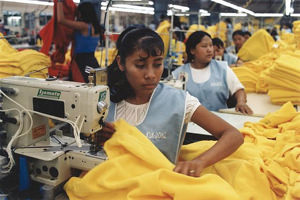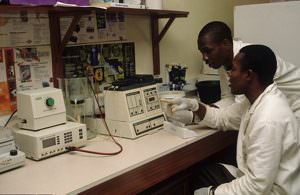A Sweatshop Game Changer
In sweatshops around the globe, long hours, poor wages, meager-to-no benefits and miserable conditions have long been the norm. But one apparel company seems intent upon changing all that. Alta Gracia may show that humane clothing production is not only possible, but also profitable. (more)
In sweatshops around the globe, long hours, poor wages, meager-to-no benefits and miserable conditions have long been the norm. But one apparel company seems intent upon changing all that. Alta Gracia may show that humane clothing production is not only possible, but also profitable.
Joe Bozich, CEO of Knights Apparel — a major player in the college apparel market — pays his workers a living wage, at least 35 percent extra for overtime and holiday work, and is still able to compete with such industry giants as Nike and Russell. Alta Gracia’s worker-friendly practices are the result of an uncommon alliance between industry, student activists and labor advocates that has its roots in the mid-1990s, when student groups began to pressure universities to buy products from companies that adhere to a manufacturing code of conduct.
The efforts seem to be paying off. Duke University has sold $430,000 worth of Alta Gracia products since August 2010. And universities in Michigan, Florida, North Carolina, Washington, Wisconsin, Ohio and California have increased their orders of Alta Gracia items.
Unfortunately, there is no legal structure in place to compel CEOs who are less socially conscious than Bozich to abandon the policies and practices that maximize profits and keep workers in dangerous, dehumanizing conditions at pay so low they struggle to survive. –Alexander Reed Kelly
Your support matters…The Nation:
Alta Gracia is an unusual collaboration between labor rights advocates, student activists and Joe Bozich, CEO of Knights Apparel, the nation’s leading producer of college clothing, which beats Nike and Adidas to dominate the $4 billion collegiate market. In 2005, Scott Nova, WRC’s executive director and a veteran human rights advocate, contacted Bozich to alert him that a company he had just acquired was doing business with a factory in the Philippines whose workers complained about labor violations to the WRC.
“Joe was unusual,” recalls Nova. “He didn’t just blame the subcontractor. He wasn’t looking for a quick fix just to get rid of a public relations problem. He was genuinely interested in how to improve conditions for the workers.”
Nova and Bozich started talking about whether the economics of clothing production allowed for “the perfect factory,” one that could produce well-made items in a safe workplace and pay workers decent wages and benefits. Worker abuse surfaces on factory floors, but it is rooted in the dynamics of the global apparel industry, in which so-called manufacturers—in reality, design and marketing firms—outsource the fabrication of clothing to independent contractors worldwide. In this labor-intensive industry where capital requirements are minimal, it is relatively easy to open a clothing factory. This has led to a global race to the bottom: there is always someplace, somewhere, clothing can be made still more cheaply. Today more than 90 percent of the clothing in US retail stores is imported.
Independent journalism is under threat and overshadowed by heavily funded mainstream media.
You can help level the playing field. Become a member.
Your tax-deductible contribution keeps us digging beneath the headlines to give you thought-provoking, investigative reporting and analysis that unearths what's really happening- without compromise.
Give today to support our courageous, independent journalists.









You need to be a supporter to comment.
There are currently no responses to this article.
Be the first to respond.